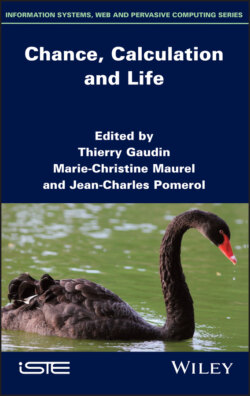Читать книгу Chance, Calculation and Life - Группа авторов - Страница 15
1.1.2. Preliminary remarks
ОглавлениеRandomness is a tricky concept which can come in many flavors (Downey and Hirschfeldt 2010). Informally, randomness means unpredictability, with a lack of patterns or correlations. Why is randomness so difficult to understand and model? An intuitive understanding comes from the myriad of misconceptions and logical fallacies related to randomness, like the gambler’s fallacy. In spite of the work of mathematicians since the Renaissance, there is the belief that after a coin has landed on tails 10 consecutive times, there are more chances that the coin will land on heads on the next flip. Similarly, common sense argues that there are “due” numbers in the lottery (since all numbers eventually appear, those that have not come up yet are “due”, and thus more likely to come up soon). Each proposed definition of randomness seems to be doomed to be falsified by some more or less clever counter-example.
Even intuitively, the quality of randomness varies: tossing a coin may seem to produce a sequence of zeroes and ones which is less random than the randomness produced by Brownian motion. This is one of the reasons why users of randomness, like casinos, lotteries, polling firms, elections and clinical evaluations, are hard pressed to “prove” that their choices are “really” random. A new challenge is emerging, namely, to “prove randomness”.
For physical systems, the randomness of a process needs to be differentiated from that of its outcome. Random (stochastic) processes have been extensively studied in probability theory, ergodic theory and information theory. Process or genesis randomness refers to such processes. On one hand, a “random” sequence does not necessarily need to be the output of a random process (e.g. a mathematically defined “random” sequence) and, conversely, a random process (e.g. a quantum random generator) is expected, but not guaranteed, to produce a “random output”. Outcome (or product) randomness provides a prima facie reason for the randomness of the process generating that outcome (Eagle 2005, p. 762), but, as argued in Frigg (2004, p. 431), process and outcome randomness are not extensionally equivalent. Process randomness has no mathematical formalization and can only be accessed/validated with theory or output randomness.
Measurement is a constant underlying issue: we may only associate a number with a “natural” process, by measurement. Most of the time we actually associate an interval (an approximation), an integer or a rational number as a form of counting or drawing.
Let us finally emphasize that, in spite of the existing theoretical differences in the understanding of randomness, our approach unifies the various forms of randomness in a relativized perspective:
Randomness is unpredictability with respect to the intended theory and measurement.
We will move along this epistemological stand that will allow us to discuss and compare randomness in different theoretical contexts.
